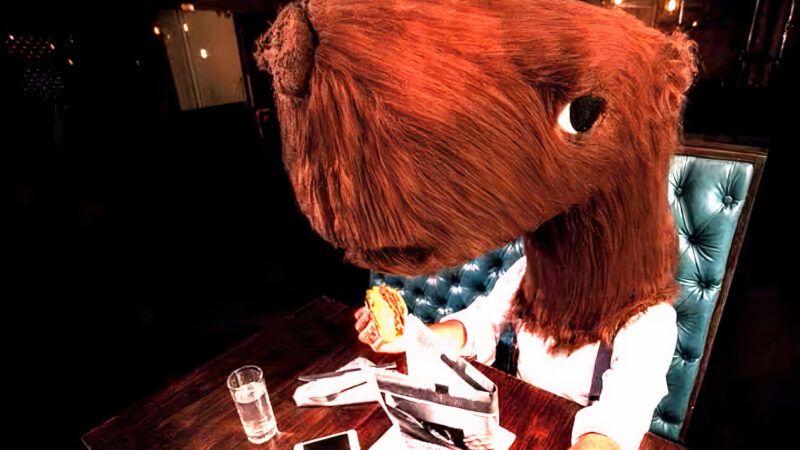Who Best Chronicles the Absurd Reality of Venezuelan Politics? A Giant Manic-Depressive Rodent
Diosdado Cabello, Nicolás Maduro's right-hand man, is threatening retribution against the satirical website.

It's no surprise that the satirical news outlet El Chigüire Bipolar is funnier than The Onion and The Babylon Bee. It has a big advantage. El Chigüire Bipolar chronicles life in Venezuela, a nation destroyed by Hugo Chávez's socialist revolution, where even straight news often reads like satire. It's a country that, since Chávez's death in 2013, has been run by Nicolás Maduro, an oafish, thick-mustached dictator, with none of his predecessors' charm, charisma, or political intuition.
Maduro was caught on camera in 2018 dining and puffing cigars at a high-end Turkish steakhouse at a time when about two-thirds of Venezuelan children under the age of 5 were suffering from malnutrition.
He not only sounds like a cartoon character, he actually is one, starring in a government-produced series called Super Bigote (translation: "Giant Mustache"), in which his avatar wears an iron fist and blue cape, thwarting the evil plots carried out by American imperialists, such as an electromagnetic attack to wipe out Venezuela's electric grid. (Yes, this was the Maduro regime's official explanation for the crippling 2019 nationwide blackout.)
El Chigüire Bipolar derives its name from the capybara ("el chigüire" in Spanish), a large rodent endemic to South America and a delicacy. (Chávez enjoyed it.) The term bipolar means the same as it does in English: manic-depressive.
With the eye for absurdity that a large manic-depressive rodent might possess, El Chigüire Bipolar tackles topics such as Venezuela's epidemic of childhood hunger and malnutrition ("Government takes Discovery Kids off the air because there is food on Peppa Pig"); its crumbling infrastructure ("Amish family moves to Venezuela to disconnect from technology and services"); its incompetent public officials ("President Maduro appoints Rage Against The Machine's first album as economy minister"); a judicial system run by Maduro's lackeys ("Venezuelan Supreme Court declares Constitution unconstitutional"); and its rampant human rights violations ("Government receives deportees from Iceland denied political asylum to give them better grounds for seeking political asylum").
El Chigüire Bipolar was founded by Juan Andrés Ravell, Elio Casale, and Oswaldo Graziani, who met in Caracas while sharing an office in the mid-aughts. Graziani and Ravell worked together on an animated series at Sony but were bristling under a lack of creative freedom. They teamed up with Casale to make Presidential Island, a cartoon series on YouTube that went viral in 2010, featuring the leaders of several Latin American countries partying together on a luxury yacht that gets shipwrecked, leaving them struggling to survive on a desert island.
They launched El Chigüire Bipolar on Blogspot, but it wasn't until they started posting their content to X (then known as Twitter) that the project spread like an "atomic bomb," Ravell recounted in an interview. Serving as a contributor for the site has since become an essential career stop for Venezuela's up-and-coming comedians.
Today there's no free press left in Venezuela. Chávez started shutting down newspapers and television stations in the mid-aughts. Eventually, criticizing the government meant bearing the risk of imprisonment and torture. News sites migrated abroad, including El Chigüire Bipolar—for the most part. The site's founders live in the United States, but the company that publishes the site is still based in Venezuela, along with many of its contributors.
So is El Chigüire Bipolar impervious to efforts by the Maduro regime to censor its content? That's currently being tested.
In November of last year, it published a story under the headline: "Diosdado congratulates Peruvian police for their performance against the Vinotinto." Diosdado Cabello is a former military officer, the country's second most powerful person, and the architect of many of Venezuela's most repressive policies. He played a direct role in the destruction of the free press, including suing El Nacional, one of Venezuela's oldest and most respected newspapers, into oblivion. As a former Chávez lackey turned influential party official, Cabello enjoys immense privileges, including hosting his own weekly late-night show on state television, Con El Mazo Dando, which awkwardly translates to "striking with a mallet."
Cabello is also head of the Special Command for Peace, an umbrella organization that coordinates Venezuelan's paramilitary squads, better known as colectivos. These repressive squads are responsible for violence against dissidents and controlling communities through terror. Vinotinto is Venezuela's national soccer team, and during the World Cup qualifier in Peru, a player was allegedly hit by the Peruvian police with a baton when trying to approach his fans.
"It gives me such nostalgia," El Chigüire Bipolar jokingly quoted Cabello as saying in response to the incident. "I remember how I used to break Julio Borges' nose every week with one of the chairs in the [National Assembly] chamber." (In 2013, Borges, an opposition leader, was injured in a congressional brawl.)
Cabello, who has been sanctioned by the United States and the European Union for human rights violations and corruption, often rails against perceived enemies of the socialist revolution on his broadcast. The joke about him congratulating Peruvian police apparently struck a nerve. On an episode of his show that aired on November 22, 2023, Cabello threatened El Chigüire Bipolar with legal action and implied that the founders would find themselves in tears in front of a judge. "This isn't a joke," he said. "They did it with the intention of spreading hate."
The repercussions of Cabello's threat aren't clear, and when contacted by Reason, a spokesperson for El Chigüire Bipolar declined to comment. The site hasn't mentioned Cabello in any of its coverage since the offending headline was published. Though the original article is still live online, its associated image is gone.
There are plenty of news sites doing real journalism about Venezuela from the safety of other countries, including Armando.Info, VPITV, and Monitoreamos. But El Chigüire Bipolar best captures the spirit of what the country has become, because it's nearly impossible to describe what's happened in Venezuela in straight prose.


Show Comments (4)